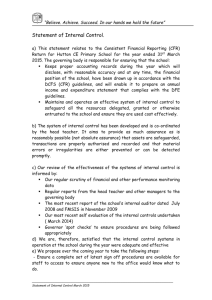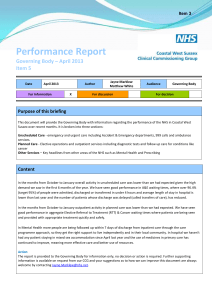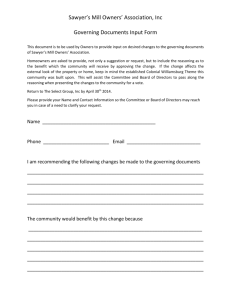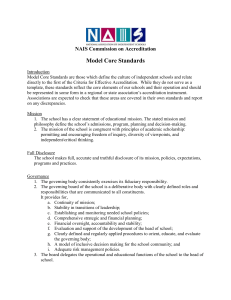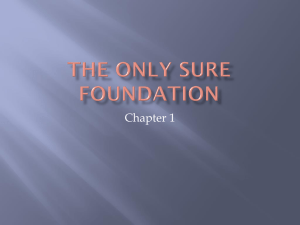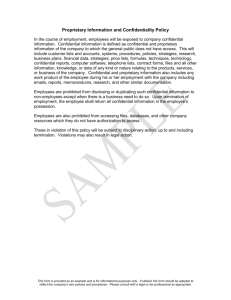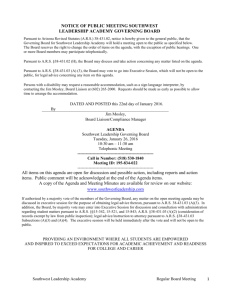MASTER COLLABORATION AGREEMENT - China
advertisement
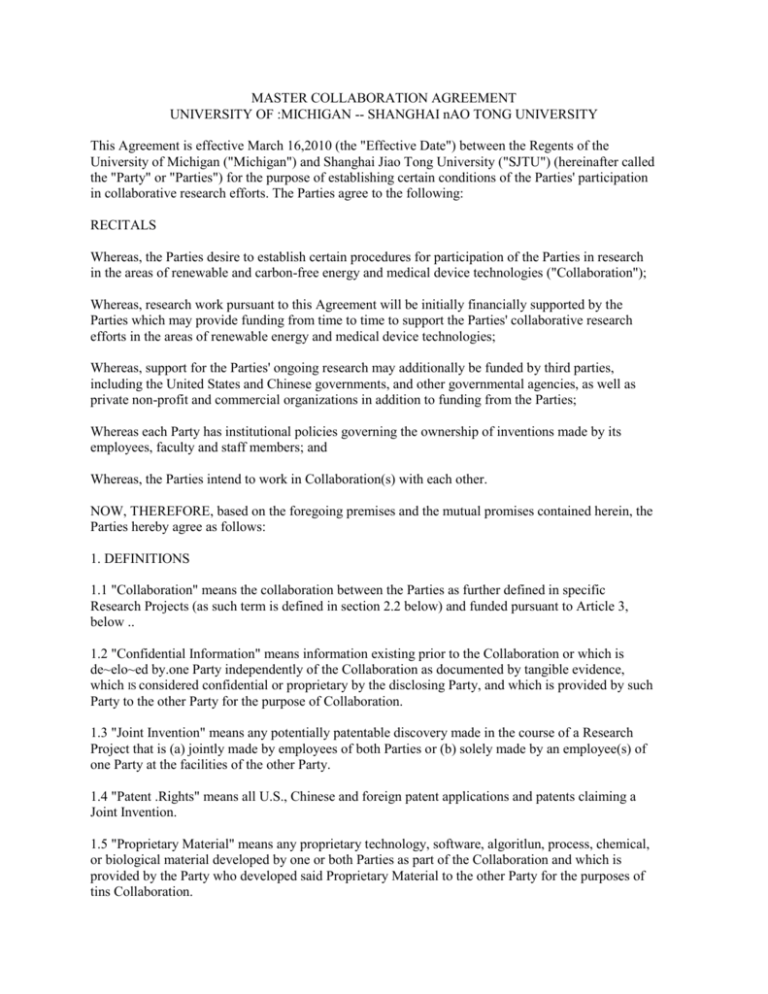
MASTER COLLABORATION AGREEMENT UNIVERSITY OF :MICHIGAN -- SHANGHAI nAO TONG UNIVERSITY This Agreement is effective March 16,2010 (the "Effective Date") between the Regents of the University of Michigan ("Michigan") and Shanghai Jiao Tong University ("SJTU") (hereinafter called the "Party" or "Parties") for the purpose of establishing certain conditions of the Parties' participation in collaborative research efforts. The Parties agree to the following: RECITALS Whereas, the Parties desire to establish certain procedures for participation of the Parties in research in the areas of renewable and carbon-free energy and medical device technologies ("Collaboration"); Whereas, research work pursuant to this Agreement will be initially financially supported by the Parties which may provide funding from time to time to support the Parties' collaborative research efforts in the areas of renewable energy and medical device technologies; Whereas, support for the Parties' ongoing research may additionally be funded by third parties, including the United States and Chinese governments, and other governmental agencies, as well as private non-profit and commercial organizations in addition to funding from the Parties; Whereas each Party has institutional policies governing the ownership of inventions made by its employees, faculty and staff members; and Whereas, the Parties intend to work in Collaboration(s) with each other. NOW, THEREFORE, based on the foregoing premises and the mutual promises contained herein, the Parties hereby agree as follows: 1. DEFINITIONS 1.1 "Collaboration" means the collaboration between the Parties as further defined in specific Research Projects (as such term is defined in section 2.2 below) and funded pursuant to Article 3, below .. 1.2 "Confidential Information" means information existing prior to the Collaboration or which is de~elo~ed by.one Party independently of the Collaboration as documented by tangible evidence, which IS considered confidential or proprietary by the disclosing Party, and which is provided by such Party to the other Party for the purpose of Collaboration. 1.3 "Joint Invention" means any potentially patentable discovery made in the course of a Research Project that is (a) jointly made by employees of both Parties or (b) solely made by an employee(s) of one Party at the facilities of the other Party. 1.4 "Patent .Rights" means all U.S., Chinese and foreign patent applications and patents claiming a Joint Invention. 1.5 "Proprietary Material" means any proprietary technology, software, algoritlun, process, chemical, or biological material developed by one or both Parties as part of the Collaboration and which is provided by the Party who developed said Proprietary Material to the other Party for the purposes of tins Collaboration. 1.6 "Research Project" means those collaborative projects funded by a Party and approved by the Governing Committee pursuant to Article 3. 1.7 "Study Data" shall mean all information derived from performance of a Research Project, including investigator's notebooks and any case reports generated by each Party. Study Data does not include fmancial and administrative information maintained by the Parties in performance of the Research Projects. 2. GOVERNANCE OF THE COLLABORATION 2.1 The initial duration of the Collaboration is for a period of5 years beginning June 29, 2010. (A "Fiscal Year" each 12 month period beginning on this date.) 2.2 The Parties agree to create a Governing Committee, which shall be charged with defining the scope of the research hereunder, including choosing the collaborative research projects to be funded hereunder ("Research Projects") and their funding amounts, and overseeing and evaluating the progress of the Research Projects. The Governing Committee shall review and approve the Annual Budgets (as defined below) of the Research Projects funded by the Parties in accordance with Article 3, below. 2.3 The Governing Committee shall consist of eight members: two lead members who shall be appointed by the Presidents of the University of Michigan and SJTU, respectively, and three associate members selected from each of Michigan and SJTU, as appointed by the lead member of each respective Party. One lead member will serve as Chair of the Governing Committee, with the Chair rotating to the other lead member on an annual basis commencing at the beginning of the anniversary of the period stated in Section 2.1, above. The Committee shall meet as often as necessary to fulfill its charter, but no less frequently than twice per year. Meetings may be held in real or virtual locations as determined by the Chair of the Governing Committee. . 2.4 The Governing Committee will solicit proposals for Research Projects at its discretion. The Governing Committee shall decide on the time periods for proposals to be solicited, submitted, transmitted, discussed and decided upon. Unsolicited proposals will be reviewed as they arise according to timelines agreed upon by the Governing Committee. In setting time periods, the Governing Committee will account for tile fact that each Party needs adequate time to review and discuss the proposals within their respective organizations before and after input from the Governing Committee. 2.5 The Governing Committee shall have no jurisdiction over proposals to be funded other than pursuant to this Agreement. The Governing Committee is responsible for communicating funding decisions to the faculty that have made proposals for Research Projects, and will do so through a funding letter directed at the appropriate institutional officials of SJTU and Michigan. 2.6 Each proposal for Research Project shall detail the specific terms that shall be applied to said Research Project (the "Research Terms"), which shall contain: (i) a description of the research to be conducted; (ii) a description of the personnel and/or any other resource or equipment of each Party to be involved in the research; (iii) a rationale for the collaboration of personnel from each Party to . successfully achieve the research goals; (iv) space required for the successful conduct of the research; (v) a time line relevant to performance of the research and submission ofreports; (vi) a budget detailing any funds to be contributed to the conduct of the proposed Research Project from any source, including internal funds ofthe Parties, for each year of the proposed Research Project ("Annual Budget"); (vii) a plan for securing 3rd party funding for the continuation of the research past the initial period of seed funding by the institutions; and (viii) identification of any background intellectual property of the Parties or intellectual property of any third party, if any, that will be utilized in the performance of the research, including a summary of the rights to be granted to or required by each Party with respect to such background intellectual property. 2.7 There will be at least one technical workshop per year to review the results of Research Projects provided such results are available for this purpose in compliance with U.S. export laws. The Governing Committee will appoint a Technical Program Committee that will organize the content and speakers for each workshop. The workshops can be at a specific location, or can be held by video conference as determined by the Technical Program Committee. If the workshop is not virtual, its location is expected to alternate between locations in the U.S. and China. 3. FUNDING and BUDGETS 3.1 Each Party shall establish appropriate internal accounts to manage the funds supporting each Research Project in accordance with their respective institutional policies and practices. 3.2 .Each Party shall provide funding of at least US$600,000 per Fiscal Year ("Seed Funding") for the initial 5 year period of the Collaboration. The Parties contemplate that the Governing Committee will award the entire amount of Seed Funding in each Fiscal Year, however if for a given Fiscal Year at least US$600,000 is not awarded pursuant to the process provided under this Agreement, then the difference between such amounts actually awarded and $600,000 shall be carried forward and added to the Seed Funding for the subsequent year. Adequate research space will be allocated by each of the Parties for successful pursuit of the Collaboration. Unless contrary to other agreements, space allocated for the purposes of collaboration will be clearly marked to promote the collaboration. 3.3 Funds from each Party will be used to support (a) that portion of a Research Project done by that Party's employees only and (b) all other non-salary expenses related to conduct of a Research Project within such Party's institution (the "Host Institution"). (For clarity, (a) the Host Institution will be responsible for all expenses related to the conduct of a Research Project in their institution except for any salary and other employment expenses (such as living expenses) of employees from the Party that is not the Host Institution. 3.4 The Governing Committee will determine the amount of funding for each Research Project at the time of approval of that Research Project. Funding for a particular Research Project is intended to provide start-up phase research resources only, with sustainable support expected to be provided by external, third parties. 3.5 Promptly after the end of each Fiscal Year, each Party will submit to the Governing Committee a general statement of reconciliation between actual expenses, including any internal funds of the Parties, with those contained in the annual budgets of Research Projects, it being understood that such statement is not intended to be an audit but only general evidence of expenditures consistent with the Research Project. 4. EXCHANGE OF INFORMATION AND MATERIALS 4.1 Subject to the limitations set forth in the applicable Research Terms, the Parties agree to exchange the results of the Research Projects with the other Party for purposes of the Collaboration as set forth in the "General Principles of SJTU-UM Collaboration", attached hereto as "Appendix A". 4.2 The Parties agree that Proprietary Material will not be used for human or animal therapeutic or clinical uses, except for any uses that are in compliance with applicable regulations and laws, and will be stored, used, and disposed of in accordance with applicable law and regulations. 4.3 Each Party will own that Study Data which is developed by its employees or agents. All Study Data of one Party shall be made available to the other Party upon request, subject to modification thereof to protect intellectual property and patient confidentiality as required by the originating Party's Institutional Review Board (IRB), and subject to compliance with applicable regulations and laws. 5. PUBLICA nONS 5.1 Nothing in this Agreement will be deemed to limit the right of either Party to publish any and all Study Data resulting from any research performed by that Party under tins Collaboration. The Parties will act in good faith to provide any publication including meeting abstracts and posters resulting from a Research Project, to the other Party thirty (30) days prior to the submission of such publication to a journal or prior to any other public disclosure. The non-publishing Party shall have this thirty (30) day period to identify any Confidential Information or potentially patentable information or subject matter owned in whole or in part by such non-publishing Party and provide comments to the publishing Party. 5.2 Whether or not the Parties decide to collaborate on a joint publication, in accordance with scientific custom, the publishing Party will reference the contributions of the non-publishing Party through acknowledgment or co-authorship, as appropriate. Acknowledgements for research support shall be made in each publication as through the following statement, "The authors acknowledge partial support from the University of Michigan-Shanghai Jiao Tong Joint Research Collaboration." 6. PATENT PROSECUTION AND LICENSE ADMINISTRATION 6.1 Inventions made solely by inventors while at their own institutions during the course of the Research Project ("Sole Inventions") shall be owned by their respective home institution and shall not be subject to this Agreement. 6.2 Each Joint Invention shall be jointed owned by the Parties unless otherwise agreed to in advance of the Research Project. 6.3 Each Party shall inform both institutions' Offices of Technology Transfer of each Joint Invention. 6.4 Each Joint Invention shall be subject to and handled as prescribed by the Master Inter- . Institutional Agreement executed concurrently with this Agreement. The Parties involved will keep this documentation in confidence in accordance with the provisions in Article 8, CONFIDENTIALITY, herein. 6.5 The Master Inter-Institutional Agreement shall dictate the appropriate sharing of patent expenses and royalty revenues for each Joint Invention based on the relative contributions of their Inventors. In cases where there is disagreement between the Parties or inventors about apportioning relative contributions, the decision will be made by collective agreement of the Governing Committee. 6.6 Each Party shall have a nonexclusive, royalty-free, irrevocable license to make and use the other Party's Sole Inventions for educational and research purposes only. 6.7 Prior to review by the Governing Committee of each Research Project, the Parties shall identify all background intellectual property as provided in Section 2.6, above. Absent a written agreement to the contrary, neither Party grants any license to any such background intellectual property for any purpose other than for the performance of the Research Project using Seed Funding. 7. TERM AND TERMINATION 7.1 The term of the Collaboration shall be for an initial period of five (5) years from the date set forth in Section 2.1, above, extendible by written agreement of the Parties. 7.2 Any Party may terminate this Agreement upon sixty (60) days prior written notice to the other Party, but such termination shall not affect any amounts awarded but not actually spent on ongoing Research Projects or rights accrued prior to the effective date of termination. 8. CONFIDENTIALITY 8.1 The Parties agree to treat and maintain the patent prosecution documents and Confidential Information of the other Party in confidence using the same degree of care as that Party uses to protect its own proprietary information of a like nature, but in any event no less than reasonable care, for a period from the date of disclosure until three (3) years after the date of its disclosure to the other Party, except that the patent prosecution documents will be treated as Confidential Information for the entire period that such documents are not publicly available through the US or Chinese patent offices, or are not subject to the exceptions in Section 8.3, below. 8.2 All Confidential Information will be labeled or marked Confidential by the disclosing Party, or if the Confidential Information is orally disclosed or in other non-tangible form, it will be reduced to writing or some other physically tangible form, marked and labeled as set forth by the disclosing party, and delivered to the receiving Party within ten (10) days after the oral or other non-tangible disclosure as a record of the disclosure and the confidential nature thereof. 8.3 Nothing contained herein will in any way restrict or impair the right of any Party to use, disclose, or otherwise deal with any Confidential Information: a) that recipient can demonstrate by written records was previously known to it; b) that is now, or becomes in the future, public knowledge other than through breach of the Agreement by the recipient; c) that is lawfully obtained without restrictions by recipient from sources independent of the disclosing Party; d) that is required to be disclosed to a governmental entity or agency in connection with seeking any governmental or regulatory approval, or pursuant to law or to request of a governmental entity or agency; e) that is furnished to a third party by the discloser without similar confidentiality restrictions imposed on such a third party, as evidenced in writing; f) that is developed by the recipient independent of the Confidential Information disclosed by the discloser, as shown by written record; or g) that a Party is required to disclose pursuant to applicable law. 8.4 Upon termination of this Agreement, at the written request of a disclosing Party, each Party will destroy or retum to the disclosing Party Confidential Information or remaining Proprietary Material received from the other within thirty (30) days following the receipt of such request. Each Party may, however, retain one copy of Confidential Information for archival purposes in non-working files. 9. MISCELLANEOUS AND DISCLAIMER OF WARRANTEES 9.1 Nothing in this Agreement is intended to restrict or prevent a Party from conducting research supported by or in collaboration with any third parties. 9.2 PROPRIETARY MATERIALS AND STUDY DATA TRANSFERRED FROM ONE PARTY TO THE OTHER PARTY UNDER THIS AGREEMENT SHALL BE PROVIDED AS IS AND WILL BE USED AT THE SOLE RISK OF THE RECEIVING PARTY. NEITHER PARTY MAKES ANY REPRESENTATIONS TO ANY OTHER PARTY WHATSOEVER AS TO THE PROPRIETARY MATERIALS. THE PARTIES MAKE NO WARRANTIES, EXPRESS OR IMPLIED, AS TO ANY MATTER WHATSOEVER, INCLUDING, WITHOUT LIMITATION, THE RESULTS OF THE COLLABORATION OR PROPRIETARY MATERIAL OR ANY INVENTION, WHETHER TANGIBLE OR INTANGIBLE, CONCEIVED, DISCOVERED, OR DEVELOPED UNDER THE COLLABORATION; OR THE OWNERSHIP, MERCHANTABILITY, OR FITNESS FORA PARTICULAR PURPOSE OF ANY PROPRIETARY MATERIAL OR ANY INVENTION. 9.3 Neither of the Parties shall be liable for any direct, consequential, or other damages suffered by the other Party and arising out of this Agreement, including, but not limited to, damages arising from loss of data or delay or termination of the Collaboration, or from the use of the results of the research, or the use of any Confidential Information or any invention. The provisions of this section shall survive the termination of this Agreement. 9.4 Neither of the Parties may assign this Agreement without the prior written consent of the other Party. 9.5 All notices sent by one Party to the other Party under this Agreement shall be sent in writing to the addresses specified on the signature pages attached thereto. The delivery of such notices shall be deemed to be effective two (2) days after delivered, prepaid to a reputable overnight courier service requesting delivery in the most expedited manner, or at the time delivered by hand delivery to the intended recipients at the addresses designated, or to such other addresses as a Party may designate by notice given in accordance herewith. 9.6 Neither of the Parties shall use the trademarks or name of any of the other or any contraction or derivative thereof or variation thereon, or the name(s) of the other Party's faculty or staff members, employees, or students, as applicable, in any advertising, promotional, sales literature, or fundraising documents without prior written consent from that named Party. 9.7 Neither Party may bind or act as an agent for any other Party or its employees for any purpose. 9.8 Each Party shall be solely liable and responsible for its compliance with all applicable laws, rules and regulations relating to this MOU and its performance there under. 9.9 Each Party may modify any activities or dissemination of information described in this Agreement as necessary to comply with export laws of their respective countries. Any such modification will not be considered a breach hereof. 9.10 The Parties agree to execute this Agreement in an English-language version and a Chinese-language version, however if there are any differences between the two versions, the English-language version shall control. 9.11 If there is any dispute between the Parties arising out of this Agreement or any implementing agreements (such as the Master Inter-Institutional Agreement), then the Parties shall initially submit the dispute to the Goveming Committee. The Governing Committee shall attempt to resolve the dispute through mediation with the parties. If the Governing Committee is unable to resolve the dispute, then it shall refer the dispute for binding arbitration handled pursuant to Intemational Chamber of Commerce rules and procedures, with the Governing Committee determining any options under such rules and procedures. Each party shall bear its own costs and expenses and an equal share of the arbitrator and administrative fees of the arbitration. The arbitrator(s) shall not award either party punitive, exemplary, or consequential damages, or attorneys fees or costs. IN WITNESS WHEREOF, these duly authorized representatives of the Parties hereby agree to the principles contained herein. By: Stephen R. Forrest Vice President for Research University of Michigan 4080 Fleming Administration Bldg. 503 Thompson Street Ann Arbor, MI 48109 USA Zhongqin Lin Deputy President Shanghai Jiao Tong University 800 Dongchuan Rd. Shanghai 200240 P. R. China APPENDIX A General Principles of The University of Michigan-Shanghai Jiao Tong University Collaboration The goal of the Collaboration is to support each Party's individual and/or collective efforts toward research and development in the area of renewable energy and medical device technologies. The function of the Collaboration is to provide unique, collaborative research opportunities that would allow the Parties to expand knowledge and capabilities in these important areas of research, by taking advantage of the considerable scientific strengths available at each of the sites. The Parties have agreed to collaborate in accordance with the following principles and guidelines: • The Parties will follow the highest standards of ethical and collegial scientific behavior. • Data generated in the course of a Research Project will be freely shared with each other, under conditions of confidentiality where appropriate and as subject to the export laws and regulations of the country providing the data. • Written reports on research as required will be made to the Governing Committee and the Offices of Technology Transfer if potential intellectual property disclosures are included in the reports of research results. • Publication and further use of data to support additional research initiatives will follow traditional academic protocols. • Clinical data generated in the course of a Research Project will be made available to each other, subject to any applicable regulations and laws as well as appropriate institutional approvals. • Biological materials, including human DNA samples and transgenic, knockout or other useful animal models arising from the Research Projects will be shared with each other and other academic researchers subject to institutional approvals (where applicable) and consistent with the NIH Guidelines on the Sharing of Research Resources. • Research selected for funding through the Collaboration, including research using human or animal subjects, will comply with all requirements for research projects supported by the United States or Chinese governments, including flow-down requirements, with specific policy requirements of the Home or Host institution, and with other performance sites. • Clinical trials will comply with all requirements of the United States Food and Drug Administration (FDA) and with requirements established by the Chinese Government for research with investigational drugs, devices, or biologics. • Required committee approvals will be maintained throughout the course of the research.

